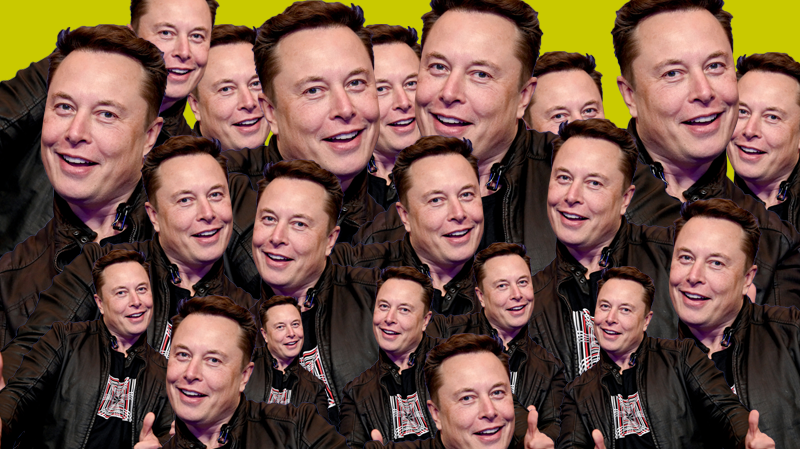Billionaires won’t save us

More Elon Musks will not save the planet, but will keep us following false solutions while the planet burns, writes Paris Marx. Image by Canadian Dimension.
Thomas Friedman is at it again. Yesterday, the longtime New York Times opinion columnist published his latest in a long line of horribly wrong takes arguing that the climate crisis will not be solved through state action, but rather by relying on market forces and empowering entrepreneurs, or “Father Profit” and “New Tech,” as he put it. Naturally, as one might expect from such an argument, he held one person up as the meeting of those two forces: billionaire man-child Elon Musk.
In his column, titled “Want to Save the Earth? We Need a Lot More Elon Musks,” Friedman brings to mind the cult followers that jump into the mentions of Musk’s increasingly unhinged tweets to praise the billionaire for any number of fantasies they hold about him. Yet Friedman is not an unknown poster sending off a tweet that no one will see—he’s a columnist at the supposed “paper of record” who has been building up the cult of Musk for over a decade.
If we go back to the post-recession days of 2011, Friedman was making a similar argument to the one found in his column. Revenge of the Electric Car is a documentary that put Musk alongside General Motors’ Bob Lutz, Renault-Nissan’s Carlos Ghosn, and a guy converting conventional vehicles to electric as the representatives of the burgeoning EV industry. But the filmmaker had a particular bias toward Musk and how he was bringing the excitement of the growing tech industry into car culture—a point reinforced by Friedman’s contribution.
The Times columnist makes an appearance in the film to argue against the state as a force that can drive the shift to electric cars. “I do not believe this is a problem that is gonna be resolved by regulators and bureaucrats,” he asserts. “This is a problem that’s gonna be solved by engineers, innovators, and entrepreneurs.” Who is best represented by those latter categories? None other than Elon Musk himself.
But the narrative Friedman is weaving is intentionally deceptive. It reflects not just the neoliberal tendency to dismiss the key role that the state plays in shaping the economy and the larger society that we live in, but also a particular strand of technological determinism that believes techno-fixes alone can solve social problems without the need to consider the more complex political dimensions.
At the time of Friedman’s comment, Tesla had already been saved from bankruptcy when the US government loaned it $465 million (and, as many people know, Musk’s various businesses are sustained by billions in public subsidies). The development of the technology that makes electric vehicles possible was also supported by government research funding over the course of many decades. Beyond that, the state is essential not only to creating the market for electric cars, but ensuring the larger structural changes that will be necessary to addressing the climate crisis.
Revenge was the sequel to the 2006 documentary Who Killed the Electric Car?, and it refutes part of Friedman’s point. The film chronicles the emergence of an electric car market in California in the 1990s because the California Air Resources Board passed a zero-emissions vehicle mandate in 1990 that required automakers to offer battery-powered options. Yet, when the regulators reversed course, the vehicles were withdrawn and the market was killed.
In countries that have grown domestic electric vehicle markets, they have been the result of state action. In Norway, for example, where nearly 80 percent of new vehicle sales are electric, the market was created through public subsidies, incentives, and other regulatory measures to promote electric vehicles. As other countries seek to expand the number of electric vehicles on their roads, they’re doing something similar: pairing subsidies with regulatory measures to phase out gas- and diesel-powered vehicles altogether.
More Elon Musks will not save the planet, but will keep us following false solutions while the planet burns. The billionaire wants us to believe all we need is electric cars and solar panels to reduce emissions, not larger structural changes to our cities and transportation systems to make them denser and more walkable. Similarly, as people are in engaged in trying to solve the problems here on Earth, Musk’s attention is increasingly turning to the stars as he claims humanity needs to colonize Mars.
Neither the market nor entrepreneurs will save us from the climate crisis. The large-scale, structural changes that are required to rapidly transform and decarbonize the systems we rely on will on be achieved by using the power of the state. Our problem, of course, is that many politicians hold the same naïve perspective as Friedman. They’re wasting their time trying to shape carbon markets, find tech solutions to delay the necessary phase-out of fossil fuels, and impress people like Elon Musk. If we’re really going to save the Earth, that needs to change.
Paris Marx is the host of the Tech Won’t Save Us podcast and author of Road to Nowhere: What Silicon Valley Gets Wrong about the Future of Transportation, coming in 2022 from Verso Books. Follow Paris on Twitter @parismarx.

